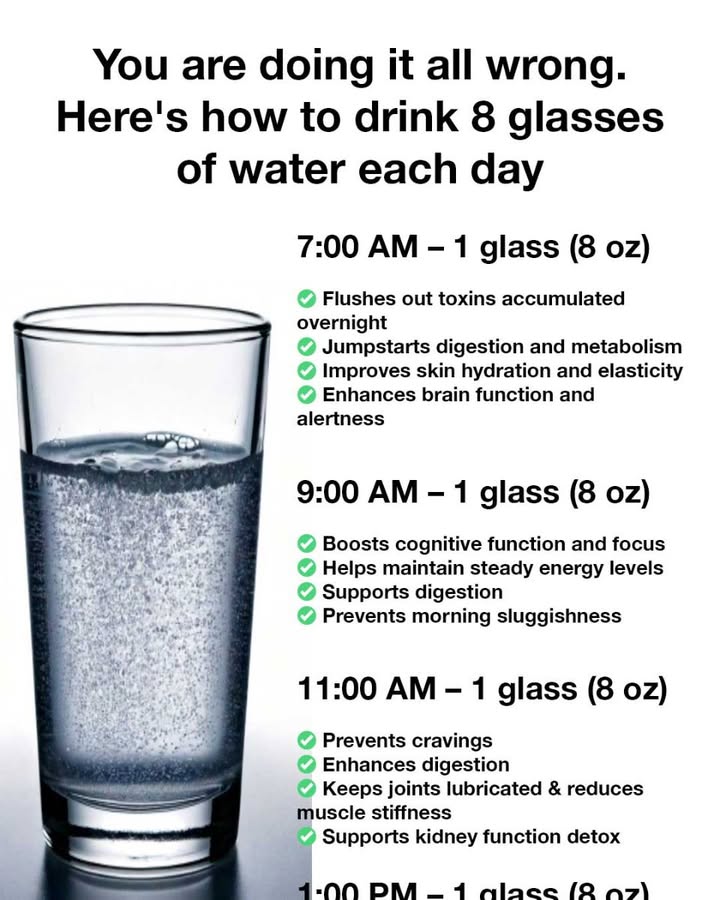Staying properly hydrated is one of the simplest yet most essential things you can do for your health. Water plays a crucial role in almost every bodily function—from regulating body temperature to aiding digestion, cushioning joints, and transporting nutrients throughout the body. But even with all the benefits, many people don’t drink enough water during the day. Understanding the importance of hydration and developing a consistent routine can significantly improve your physical performance, mood, and mental clarity.

What the “8 Glasses a Day” Rule Really Means
You’ve probably heard the old guideline: drink eight 8-ounce glasses of water a day. That adds up to about two liters, or half a gallon. While this rule works as a basic target, it doesn’t apply to everyone in the same way. Your personal hydration needs depend on your age, activity level, gender, and the climate where you live. Instead of rigidly sticking to this number, listen to your body’s signals and adjust accordingly. Thirst, dry mouth, dark-colored urine, and fatigue are all signs you may need more fluids.
Debunking Common Water Intake Myths
There are plenty of myths about staying hydrated. One common misconception is that all fluids count the same. While drinks like juice, tea, or soda do contain water, beverages like coffee and alcohol can have a diuretic effect, which may contribute to dehydration. Another myth is that thirst is the best indicator of when to drink water. The truth is, if you feel thirsty, you’re already a bit dehydrated. And no, gulping down large amounts of water in one sitting isn’t more effective—your body does best when you hydrate steadily throughout the day.
How to Build a Simple Water Drinking Schedule
Setting up a consistent routine is a great way to make sure you’re getting enough water. Try drinking a glass of water at specific times during the day, like when you wake up, with meals, and during breaks. A water bottle with time markers can be a helpful tool to keep you on track. Here’s a sample schedule you can follow or modify based on your lifestyle:
7:00 AM – 1 Glass (8 oz)
Start your day with a glass of water. Your body gets dehydrated overnight, so drinking water first thing can help jumpstart your metabolism and flush out toxins. It also hydrates your skin and boosts brain function.
9:00 AM – 1 Glass (8 oz)
Keep the momentum going. This mid-morning hydration helps maintain your energy levels and supports concentration—perfect if you’re starting to feel sluggish or need to focus.
11:00 AM – 1 Glass (8 oz)
Drinking water before lunch keeps your appetite in check and helps avoid unnecessary snacking. It also aids digestion and supports joint health and kidney function.
1:00 PM – 1 Glass (8 oz)
A post-lunch glass of water supports digestion and helps prevent bloating. It also helps regulate your circulation and prevents that sleepy, post-meal crash.
3:00 PM – 1 Glass (8 oz)
Afternoon fatigue often comes from dehydration. Drinking water at this time can improve concentration, reduce the risk of headaches, and stabilize blood pressure.
5:00 PM – 1 Glass (8 oz)
Whether you’re heading to the gym or prepping dinner, this glass will help fuel your body. It also curbs hunger and preps your digestive system for your evening meal.
7:00 PM – 1 Glass (8 oz)
After dinner, water helps with digestion and may keep you from reaching for a late-night snack. It also promotes healthy skin and a good night’s sleep.
9:00 PM – 1 Glass (8 oz)
A final small glass before bed keeps you from dehydrating overnight, supports detoxification, and helps your body wind down. Just don’t overdo it, or you might be waking up for bathroom breaks.
Bonus Tips for Staying Hydrated
-
Adjust for Exercise: Add 1–2 glasses of water if you’ve been working out or sweating more than usual.
-
Use a Reusable Water Bottle: Having one on hand makes it easier to sip throughout the day and track how much you’ve consumed.
-
Flavor Your Water: If plain water feels boring, infuse it with lemon, mint, or cucumber to make it more enjoyable.
-
Pay Attention to Your Body: If you’re thirsty or your urine is dark yellow, it’s time to drink up.
The Health Perks of Staying Hydrated All Day Long
When you stay hydrated consistently, the benefits go beyond just quenching your thirst. You’ll likely notice better physical performance during workouts, improved concentration and memory, and a more stable mood. Proper hydration supports your heart by maintaining healthy blood pressure and volume, and it helps your kidneys eliminate waste efficiently. You may also see clearer skin, fewer headaches, and better digestion. It’s a small habit with a big payoff.
Making Water a Daily Habit
Creating a lasting water habit doesn’t have to be difficult. Set reminders on your phone or use a hydration-tracking app. Keep a water bottle within reach—on your desk, in your bag, or next to your bed. You can even set mini-goals throughout the day, like finishing half your daily intake by lunchtime. The more you integrate water into your routine, the more natural it will feel. And don’t forget to celebrate progress, even if it’s just an extra glass or two a day at first.
Final Thoughts: How to Reach Your Hydration Goals
Staying hydrated every day is doable—and it doesn’t have to be complicated. Start by understanding your body’s needs and finding a schedule that works for you. Ditch the myths, stay consistent, and make water a regular part of your day. Over time, these small actions will lead to better energy, sharper focus, and improved overall health. Drink up—it’s one of the best things you can do for your body.





